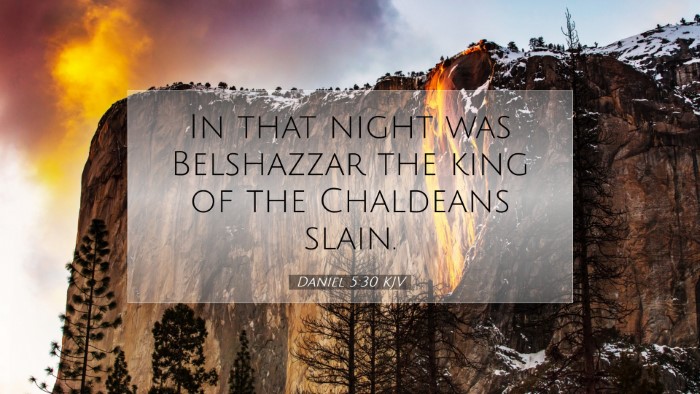Commentary on Daniel 5:30
Verse Context: Daniel 5:30 states, "In that night was Belshazzar the king of the Chaldeans slain." This verse concludes the narrative of the fall of Babylon and the judgment of King Belshazzar, highlighting the moment of divine retribution.
Historical Context
The historical backdrop of Daniel 5 involves the reign of Belshazzar, who is often depicted as the last king of Babylon. During a great feast, he blasphemously uses the sacred vessels from the Jerusalem temple, an act that provokes divine wrath. The subsequent appearance of the mysterious handwriting on the wall serves as a warning and foretells his doom.
Theological Implications
- Divine Sovereignty: The verse underscores the sovereignty of God over earthly kingdoms. Belshazzar, despite his power, cannot escape the judgment ordained by the Almighty.
- Judgment and Accountability: It teaches that rulers and individuals alike are accountable to God for their actions, particularly in matters of worship and respect towards the sacred.
- Finality of Divine Decrees: The use of "that night" emphasizes the immediacy and finality of God’s judgment; it can come swiftly and unexpectedly.
Insights from Public Domain Commentaries
Matthew Henry’s Commentary
Henry remarks that the fall of Belshazzar exemplifies how the most secure of kings can fall from grace in a moment of divine judgment. He emphasizes the gravity of Belshazzar's sacrilege in using the holy vessels for profane purposes. This act not only shows contempt for God but also indicates a perilous arrogance that caused his downfall.
Henry also comments on God’s intervention in human affairs. Despite the opulence and power of Babylon, when the time comes for God to act, no earthly structures or defenses can withstand His decree. The night of Belshazzar’s death serves as a somber reminder of the transitory nature of worldly power.
Albert Barnes’ Notes
Barnes provides a detailed examination of the phrase "was slain", indicating not merely a physical death but also the end of an era. He reflects on the implications of this judgment, noting that Belshazzar represents all rulers who disregard their responsibilities and mock justice, ultimately leading to their demise.
Moreover, Barnes highlights the contrast between the pride of Belshazzar and the humility of Daniel. Belshazzar's failure to recognize the signs of impending doom is seen as a spiritual blindness that many rulers suffer, leading to their destruction. His notes insist on the importance of acknowledging God’s authority over life and death.
Adam Clarke’s Commentary
Clarke provides a profound exploration of the character of Belshazzar. He notes that the king’s indulgence in revelry amidst a siege reflects a profound moral and spiritual failing. Clarke emphasizes the stark transition from feast to bloodshed that occurs in the narrative, which serves as a vivid illustration of divine judgment executed.
Clarke also explores the judgment's implications not just for the king but for the entire Babylonian system of governance. He argues that the text calls into question the integrity of those in leadership and serves as a warning to future leaders regarding the fate awaiting those who defile the sacred and reject true wisdom.
Application for Today
- Leadership Responsibility: The passage is a reminder to those in positions of power to respect divine authority and act with integrity and justice.
- A Call for Humility: It illustrates the dangers of pride and the importance of humility before God, which is critical for both personal and communal spiritual health.
- Awareness of Consequences: Believers are reminded of the certainty of divine judgment; thus, it encourages a lifestyle of repentance and holiness in alignment with God’s standards.
Conclusion
Daniel 5:30 serves as a powerful testament to God's sovereignty and justice. It encapsulates the historical fall of Babylon and presents timeless theological truths about accountability and divine retribution. For pastors, theologians, and scholars, this passage invites deeper reflection on leadership, the importance of reverence towards holy matters, and the immutable truth that ultimately, God's will prevails over all human schemes.


